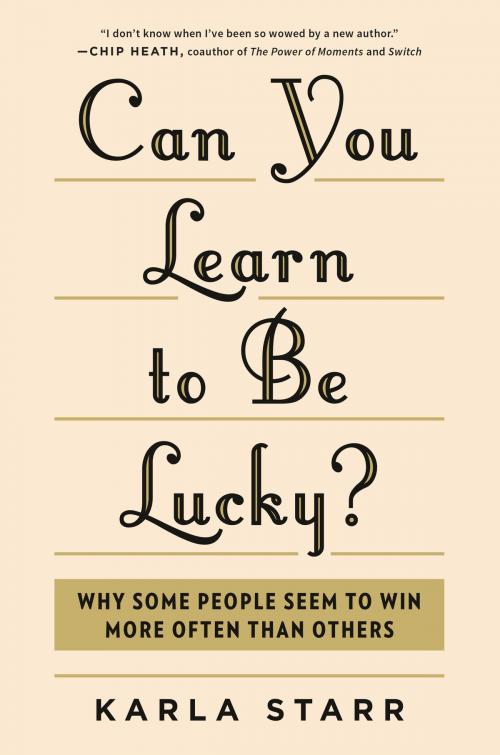Can You Learn to Be Lucky?
Why Some People Seem to Win More Often Than Others
Nonfiction, Health & Well Being, Psychology, Personality, Cognitive Psychology, Interpersonal Relations| Author: | Karla Starr | ISBN: | 9780698139817 |
| Publisher: | Penguin Publishing Group | Publication: | August 14, 2018 |
| Imprint: | Portfolio | Language: | English |
| Author: | Karla Starr |
| ISBN: | 9780698139817 |
| Publisher: | Penguin Publishing Group |
| Publication: | August 14, 2018 |
| Imprint: | Portfolio |
| Language: | English |
**“I don't know when I've been so wowed by a new author”
–Chip Health, co-author of The Power of Moments and Switch
A talented journalist reveals the hidden patterns behind what we call "luck" -- and shows us how we can all improve outcomes despite life’s inevitable randomness.**
"Do you believe in luck?" is a polarizing question, one you might ask on a first date. Some of us believe that we make our own luck. Others see inequality everywhere and think that everyone’s fate is at the whim of the cosmos. Karla Starr has a third answer: unlucky, "random" outcomes have predictable effects on our behavior that often make us act in self-defeating ways without even realizing it.
In this groundbreaking book, Starr traces wealth, health, and happiness back to subconscious neurological processes, blind cultural assumptions, and tiny details you're in the habit of overlooking. Each chapter reveals how we can cultivate personal strengths to overcome life’s unlucky patterns. For instance:
• Everyone has free access to that magic productivity app—motivation. The problem? It isn’t evenly distributed. What lucky accidents of history explain patterns behind why certain groups of people are more motivated in some situations than others?
• If you look like an underperforming employee, your resume can't override the gut-level assumptions that a potential boss will make from your LinkedIn photo. How can we make sure that someone’s first impression is favorable?
• Just as people use irrelevant traits to make assumptions about your intelligence, kindness, and trustworthiness, we also make inaccurate snap judgments. How do these judgments affect our interactions, and what should we assume about others to maximize our odds of having lucky encounters?
We don’t always realize when the world's invisible biases work to our advantage or recognize how much of a role we play in our own lack of luck. By ending the guessing game about how luck works, Starr allows you to improve your fortunes while expending minimal effort.
**“I don't know when I've been so wowed by a new author”
–Chip Health, co-author of The Power of Moments and Switch
A talented journalist reveals the hidden patterns behind what we call "luck" -- and shows us how we can all improve outcomes despite life’s inevitable randomness.**
"Do you believe in luck?" is a polarizing question, one you might ask on a first date. Some of us believe that we make our own luck. Others see inequality everywhere and think that everyone’s fate is at the whim of the cosmos. Karla Starr has a third answer: unlucky, "random" outcomes have predictable effects on our behavior that often make us act in self-defeating ways without even realizing it.
In this groundbreaking book, Starr traces wealth, health, and happiness back to subconscious neurological processes, blind cultural assumptions, and tiny details you're in the habit of overlooking. Each chapter reveals how we can cultivate personal strengths to overcome life’s unlucky patterns. For instance:
• Everyone has free access to that magic productivity app—motivation. The problem? It isn’t evenly distributed. What lucky accidents of history explain patterns behind why certain groups of people are more motivated in some situations than others?
• If you look like an underperforming employee, your resume can't override the gut-level assumptions that a potential boss will make from your LinkedIn photo. How can we make sure that someone’s first impression is favorable?
• Just as people use irrelevant traits to make assumptions about your intelligence, kindness, and trustworthiness, we also make inaccurate snap judgments. How do these judgments affect our interactions, and what should we assume about others to maximize our odds of having lucky encounters?
We don’t always realize when the world's invisible biases work to our advantage or recognize how much of a role we play in our own lack of luck. By ending the guessing game about how luck works, Starr allows you to improve your fortunes while expending minimal effort.















